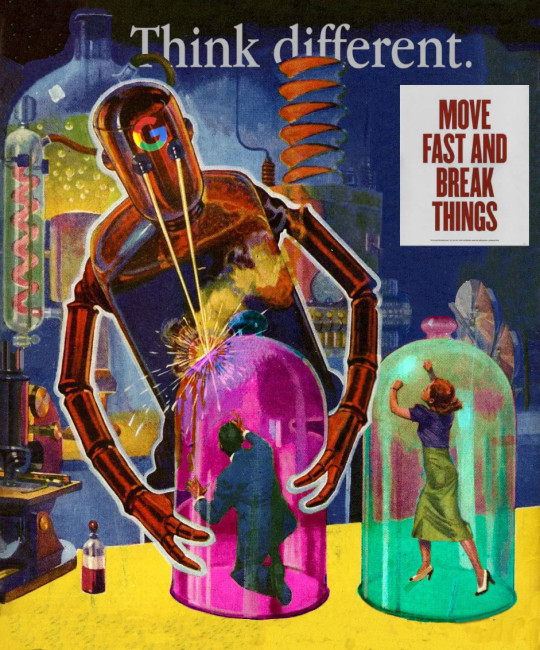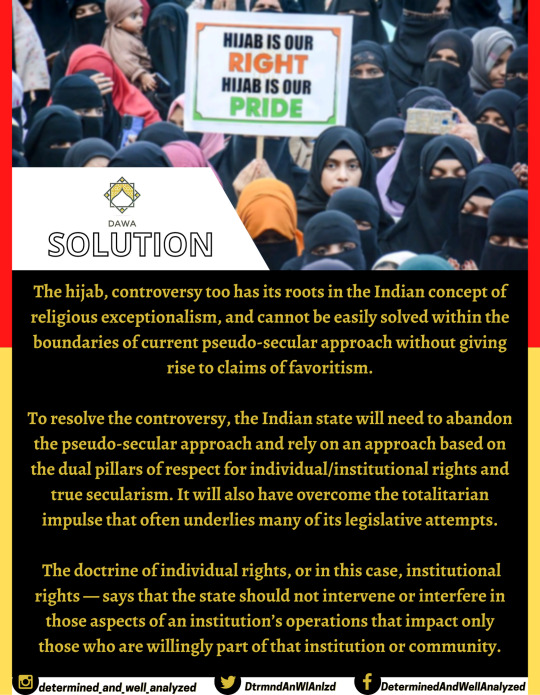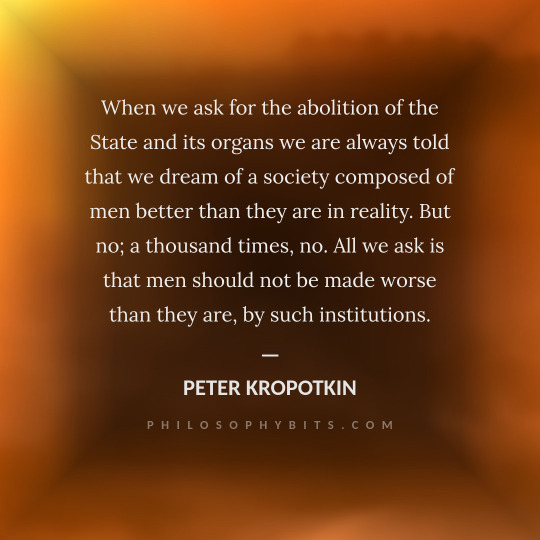#Institutions
Quote
In all institutions that are not open to the biting air of public criticism an innocent corruption flourishes like a fungus (as, for example, in learned bodies and senates).
Friedrich Nietzsche, Human, All Too Human, 468
103 notes
·
View notes
Text
Don’t Be Evil

Tonight (November 22), I'll be joined by Vass Bednar at the Toronto Metro Reference Library for a talk about my new novel, The Lost Cause, a preapocalyptic tale of hope in the climate emergency.

My latest Locus Magazine column is "Don't Be Evil," a consideration of the forces that led to the Great Enshittening, the dizzying, rapid transformation of formerly useful services went from indispensable to unusable to actively harmful:
https://locusmag.com/2023/11/commentary-by-cory-doctorow-dont-be-evil/
While some services have fallen harder and/or faster, they're all falling. When a whole cohort of services all turn sour in the same way, at the same time, it's obvious that something is happening systemically.
After all, these companies are still being led by the same people. The leaders who presided over a period in which these companies made good and useful services are also presiding over these services' decay. What factors are leading to a pandemic of rapid-onset enshittification?
Recall that enshittification is a three-stage process: first surpluses are allocated to users until they are locked in. Then they are withdrawn and given to business-customers until they are locked in. Then all the value is harvested for the company's shareholders, leaving just enough residual value in the service to keep both end-users and business-customers glued to the platform.
We can think of each step in that enshittification process as the outcome of an argument. At some product planning meeting, one person will propose doing something to materially worsen the service to the company's advantage, and at the expense of end-users or business-customers.
Think of Youtube's decay. Over the past year, Google has:
Dramatically increased the cost of ad-free Youtube subscriptions;
Dramatically increased the number of ads shown to non-subscribers;
Dramatically decreased the amount of money paid to Youtube creators;
Added aggressive anti-adblock;
Then, this week, Google started adding a five-second blanking interval for non-Chrome users who have adblockers installed:
https://www.404media.co/youtube-says-new-5-second-video-load-delay-is-supposed-to-punish-ad-blockers-not-firefox-users/
These all smack of Jenga blocks that different product managers are removing in pursuit of their "key performance indicators" (KPIs):
https://pluralistic.net/2023/07/28/microincentives-and-enshittification/
We can think of each of these steps as the outcome of an argument. Someone proposes a Youtube subscription price-hike, and other internal stakeholders object. These objections fall into two categories:
We shouldn't do this because it will make the product worse; and/or
We shouldn't do this because it will reduce the company's earnings.
Lots of googlers sincerely care about product quality. People like doing a good job, and they take pride in making good things. Many have sacrificed something that mattered in the service of making the product better. It's bad enough to miss your kid's school play so you can meet a work deadline – but imagine making that sacrifice and then having the excellent work you put in deliberately degraded.
I have been around Google's orbit since its early days, going to the odd company Christmas party in the early 2000s and giving talks at Google offices in cities all over the world. I've known hundreds of skilled googlers who passionately cared about making the best products they could.
For most of Google's history, those googlers won the argument. But they didn't do so merely by appealing to their colleagues' professional pride in a job well-done. For most of Google's history, the winning argument was a combination of "doing this bad thing would make me sad," and "doing this bad thing will make Google poorer."
Companies are disciplined by three forces:
Competition (the fear of losing business to a rival);
Regulation (the fear of legal penalties that would exceed the expected profits from a given course of action);
Self-help (the fear that customers or users will change their behavior, say, by installing an ad-blocker).
The ability of googlers to win enshittification arguments by appealing to the company's bottom line was a function of one or more of these three disciplining factors. The weakening of each of these factors is the reason that every tech company is sliding into enshittification at once.
For example, when Google contemplates raising the price of a Youtube subscription, the dissent might say, "Well, this will reduce viewership and might shift viewers to rivals like Tiktok" (competition). But the price-hiking side can counter, "No, because we have a giant archive, we control 90% of searches, we are embedded in the workflow of vloggers and other creators who automatically stream and archive to Youtube, and Youtube comes pre-installed on every Android device." Even if the company leaks a few viewers to Tiktok, it will still make more money in aggregate. Prices go up.
When Google contemplates increasing the number of ads shown to nonsubscribers, the dissent might say, "This will incentivize more users to install ad-blockers, and then we'll see no ad-revenue from them." The pro-ad side can counter, "No, because most Youtube viewing is in-app, and reverse-engineering the Youtube app to add an ad-blocker is a felony under Section 1201 of the Digital Millennium Copyright Act. As to non-app viewers: we control the majority of browser installations and have Chrome progressively less hospitable to ad-blocking."
When Google contemplates adding anti-adblock to its web viewers, the dissent might say, "Processing users' data in order to ad-block them will violate Europe's GDPR." The anti-adblock side can counter, "But we maintain the fiction that our EU corporate headquarters is in the corporate crime-haven of Ireland, where the privacy regulator systematically underenforces the GDPR. We can expect a very long tenure of anti-adblock before we are investigated, and we might win the investigation. Even if we are punished, the expected fine is less than the additional ad-revenue we stand to make."
When Google contemplates stealing performers' wages through opaque reshufflings of its revenue-sharing system, the dissent might say, "Our best performers have options, they can go to Twitch or Tiktok." To which the pro-wage-theft side can counter, "But they have no way of taking their viewers with them. There's no way for them to offer their viewers on Youtube a tool that alerts them whenever they post a new video to a rival platform. Their archives are on Youtube, and if they move them to another platform, there's no way redirect users searching for those videos to their new homes. What's more, any attempt to unilaterally extract their users' contact info, or redirect searchers or create a multiplatform client, violates some mix of our terms of service, our rights under DMCA 1201, etc."
It's not just Google. For every giant platform, the threats of competition, regulation and self-help have been in steady decline for years, as acquisitions, underenforcement of privacy/labor/consumer law, and an increase in IP protection for incumbents have all mounted:
https://locusmag.com/2020/09/cory-doctorow-ip/
When internal factions at tech companies argue about whether to make their services worse, there's a heavy weight tilting the scales towards enshittification. The lack of competition, an increase in switching costs for users and business-customers, and broad powers to prevent users from modifying the service for themselves all mean that even when a product gets worse, profits can still go up.
This is the culprit: monopoly, and its handmaiden, regulatory capture. That's why today's antimonopoly movement – and the cases against all the tech giants – are so important. The old, good internet was built by flawed tech companies whose internal ranks included the same amoral enshittifiers who are gobbling up the platforms' seed corn today. The thing that stood in their way before wasn't merely the moral character of colleagues who shrank away from these cynical maneuvers: it was the economic penalties that befell those who enshittified too rashly.
Incentives matter. Money talks and bullshit walks. Enshittification isn't due to the moral failings of individuals in tech companies. It's possible to have a good internet run by flawed people. But to get that new, good internet, we have to support technologists of good will and character by terrorizing their venal and cynical colleagues by hitting them where they live: in their paychecks.

If you'd like an essay-formatted version of this post to read or share, here's a link to it on pluralistic.net, my surveillance-free, ad-free, tracker-free blog:
https://pluralistic.net/2023/11/22/who-wins-the-argument/#corporations-are-people-my-friend
#pluralistic#microeconomics#incentives matter#microincentives#enshittification#corporate discipline#big tech#competition#too big to fail#too big to jail#ip#dont be evil#google#institutions#locus magazine
195 notes
·
View notes
Text

The hijab controversy too has its roots in the Indian concept of religious exceptionalism. To resolve the controversy, the Indian state will need to abandon the pseudo-secular approach & rely on an approach based on the dual pillars of respect for individual/institutional rights.
#solution#hijab#controversy#indian#concept#religious#secular#state#claim#individual#institutions#secularism#true#right#attempt#operation#impact#aspect#community#respect#impulse#root#approach#case#doctrine#deal#at#weekly#act#dawa
581 notes
·
View notes
Photo

27 février 1594 : Henri IV est sacré roi de France à Chartres, Reims étant tenue par la Ligue ➽ http://bit.ly/Sacre-HenriIV Le roi avait résolu de se faire sacrer, mais la ville de Reims était au pouvoir de la Ligue. Son conseil décida que cette cérémonie aurait lieu dans l’église de Chartres, « pour la particulière dévotion que ses ancêtres y avaient toujours portée »
#CeJourLà#27Février#sacre#roi#HenriIV#Chartres#Reims#Ligue#cérémonie#institutions#histoire#france#history#passé#past#français#french#news#événement#newsfromthepast
20 notes
·
View notes
Text
My mom was channel-surfing last night and we ended up watching a few episodes of Gordon Ramsay's Kitchen Nightmares. I noticed it implicitly suggested some interesting things about how small businesses fail and some uncomplimentary things about how "small business owner" works as a social role.
I saw episodes covering three restaurants (including the infamous Amy's Baking Company) and there were certain patterns that kept recurring. Each of these restaurants was owned and managed by a middle-aged to elderly married couple. Often the couple's adult children were working in the restaurant with them. So these are institutions where the capitalist employee-employer hierarchy is synthesizing with pre-capitalist family/gerontocratic/patriarchal hierarchies. And these couples are totally living that American Red Tribe "make capitalism democratic by bringing as many people as possible into the property-owning and business-owning classes" dream. And there was a repeating pattern where the regular employees could see the business's problems, even the adult children of the owner couple could see the business's problems, and all the problems seemed to basically come out of the owner couple, who had a lot of illusions about how well they were managing the restaurant and who seemed used to being big fish in a tiny pond.
In one case apparently everyone in the business could see the problems except for literally just one guy, but that one guy was the husband in the owner couple, and it seemed like the pre-Ramsay status quo was everything just kept running the way that one guy wanted things run even as his own son and wife were telling him there were problems. And it's pretty easy to see how that would happen: as the owner and patriarch that one guy thought his word should be the last word and had the clout and power to make things work that way.
And it didn't even seem like these owners were sealed in an information bubble, it seemed like other people (customers, their own staff, their own family members who also worked in the restaurant) would tell them that there were problems but what those people said was dismissed. The problem didn't seem to be so much what information was reaching them as how they were interpreting that information. These owners tended to be people who'd worked in the restaurant for decades and thought they knew what they were doing because they had experience, but I suspect what happened was because of the power dynamics at work a lot of that experience consisted of them becoming more entrenched in what they were already doing, more entrenched in beliefs and behaviors that were comfortable for them, and more dismissive of contrary perspectives.
It made me wonder how much of Gordon Ramsay's role and value in this dynamic is just that he's somebody the local Emperor doesn't have power over who gets to tell the Emperor they have no clothes.
The Amy's Baking Company couple are internet meme level infamous, but I saw the same pattern with owners who seemed to be, to put it plainly, nicer and better-intentioned. In this context the ABC couple seemed less like an anomaly and more like an extreme example of a much bigger trend.
This seems like a dysfunction/failure state very strongly connected to the fact that these businesses are hierarchical institutions. It really makes me think of the thing David Graeber said about how power can make you stupid; when you have power you don't need to know things, so you don't.
I suspect a society where most businesses were worker-owned cooperatives would not have this problem as much. Though businesses like that would likely have other problems.
317 notes
·
View notes
Photo

Locations of the European Institutions
93 notes
·
View notes
Text

Light Art Space
#Light Art Space#LAS#arts organisation#present#future imaginaries#tomorrow#possibilities#artists#thinkers#institutions#programme#visit#eye#explore#typography#type#typeface#font#ABC Diatype#Mono#OSGrotesktype#2024#Week 03#website#web design#inspire#inspiration#happywebdesign
6 notes
·
View notes
Text
I just made a post saying that the current system feels like an endless maze, and I wanted to elaborate, talk about bureaucracy, how institutions create strategic inefficiencies, etc.
It’s hard to define the feeling that is created directly in a term as simple as ‘despair.’ Instead, let us think of what it is not. In my opinion, the opposite is walking in a forest. The openness contradicts the closed off feeling, the sounds do the same to the silence, and most importantly, you have control. You can choose what direction you go. In the current system, to even complain about a problem, you have to go through many different people and things, all of which are pushing you out. They will respond slowly, forcing you to work so much for just a corporate non-response.
In every part there is a feeling of illusion, that all that is around you is an imitation. It is, since although it is attempting to replicate the emotions, patterns, and soul of something living, it fails. See the corporate email, robotically saying “We are very concerned.” The institution can only cage emotion, not create it. It creates a soulless symmetry of unnatural repetition, desperately trying to make you feel the empathy for it that it will never feel for you.
If you are a worker, you probably see jobs everyday plastered with the words “We’re a family here!” You probably also see that none of these jobs offer the feeling of connection they promise. The institution cannot create feeling, no matter how skilled its creator, there is always a way to realize that what you are interacting with has no life.
Where does that leave us? Those of us trapped within?
The system may try to take your joy, but it cannot take your anger. The system cannot make you feel happiness, so it must not make you feel despair.
#eat the rich#strategic inefficiencies#Corporations#institutions#governments#despair#emotions#this is something
8 notes
·
View notes
Photo

An important art of politicians is to find new names for institutions which under old names have become odious to the public.
- Talleyrand
British politics. Dear oh dear.
#talleyrand#politics#quote#institutions#political institutions#politicians#culture#society#corruption#british politics#number 10
43 notes
·
View notes
Text

#philosophy#quotes#Peter Kropotkin#Anarchism: Its Philosophy and Ideal#Kropotkin#freedom#liberty#institutions#states#society#humanity#politics
10 notes
·
View notes
Text

I like this line, especially the "unjust peace" part. One point which MSG:tWFM has been hammering on is that when injustice becomes embedded in our governing institutions, you can't achieve justice within the system. It's sympathetic to those who try to break those institutions, even while they do things that are (and are framed as) immoral. "Starting a giant robot war is wrong, but they have good reasons."
Also, I can share the screencap without fear of spoilers, because nobody can tell what's going on.
#gundam#gundam witch from mercury#anime#themes#institutions#politics#i can't bring politics into this—they're already here#random thoughts
16 notes
·
View notes
Photo

15 mars 1667 : création de la charge de lieutenant de police de Paris Il s’en fallait beaucoup que la ville de Paris fût alors ce qu’elle est aujourd’hui ; il n’y avait ni clarté, ni sûreté, ni propreté. Il fallait pourvoir à l'illumination des rues et faire veiller une garde continuelle à pied et à cheval pour la sûreté des citoyens ➽ http://bit.ly/Lieutenant-Police
#CeJourLà#15Mars#Création#Charge#Lieutenant#Police#LaReynie#Institutions#Office#Sécurité#Ville#Paris#Propreté#Éclairage#Histoire#France#history#passé#past#français#french#news#événement#newsfromthepast
14 notes
·
View notes
Text
One of the hardest things about being a trailblazer for organizations as a student is seeing that students who come after you get acknowledgment from the institution for work you started. But the easiest thing is to keep being a trailblazer, do what you set out to do, and don’t care about whether or not you receive the acknowledgment from institutions that never have a fuck about you in the first place.
#rant#personal rant#college struggles#undergraduate#graduate school#student leadership#academic validation#institutions#social media is hard#but I am good at it#and I laid the groundwork#but got to move on#honestly could sue certain schools for how I was treated#time for therapy
2 notes
·
View notes
Text

"Que l’histoire traîne ou qu’elle mène l’affaire rondement, s’il subsiste une culture digne de ce nom, c’est parce que des jeunes gens grandissent au sein d’institutions raisonnables, qu’un long passé de succès rend légitimes ; faute de quoi des legs irremplaçables seront dilapidés : la discipline, la patience, l’évidence, et des inhibitions qu’on ne saurait justifier logiquement, mais que l’on peut supprimer, avant d’être forcé de les rétablir par la violence."
Arnold Gehlen, Morale et hypermorale, trad. François Poncet, 1969.
5 notes
·
View notes
Photo




Fantastic Fungi (2019)
Myths & Monsters, “The Wild Unknown” (2017)
“Adam and Eve with the Tree of Knowledge as Death” (1587)
“For centuries, knowledge has been pursued as a defense against truth.”
— Jacques Lacan, Seminar XIII (1966)
“We inherit from Greek philosophy the belief that knowledge is liberating, but the biblical myth of the Fall is closer to the truth.”
— Heresies (2004)
“[Lev] Shestov came to faith by way of radical doubt. But sceptical doubt, however radical, cannot bring the unlimited freedom Shestov demanded. What he wanted was to return to things as they were before the Fall, when all things seemed possible. But the Fall is the price of consciousness.
There is no way back.”
— Seven Types of Atheism (2018)
— John N. Gray
“God is not free to enact the law that renders Adam and Eve free. God’s name carries with it the prohibition, which is why it is impossible to envision a Garden of Eden with God and without prohibition. But the necessity of law disrupting the image of paradise is not a fact to be lamented.
Genuine freedom is not compatible with a Garden of Eden lacking the prohibited tree. We can imagine the harmony of the prelapsarian world where there would be no negation, but we cannot even sustain this image. The moment we imagine how life would transpire in this world, we introduce negation. The prohibition simply makes us aware of the power of the negative and the freedom that it grants us. The prohibition opens up freedom because it introduces “no” into the signifying structure.
[…]
The difficulty of confronting the nonsense of the prohibition in modernity is that a basic premise of modernity involves the rejection of non-sensical imperatives. Modernity craves sense. To modern ears, the primordial signifier sounds like a holdover from traditional society that has no place in the modern universe. But modernity cannot, any more than traditional society, do without its point of nonsense.”
— Todd McGowan, “The psychosis of freedom: Law in modernity” in Lacan on Psychosis (2018)
“A perverse subject desires to see any lack in the Other as one which can be filled.
…
Sade negates God, who is a metonymy for the limits of the Other of knowledge, by way of disavowal. André referred to Annie Le Brun’s book, Sade: A Sudden Abyss (1990), in his discussion of the function of Sade’s negation of God. Andre concluded that Sade’s “proliferation of blasphemy” functions to fill the “gaping hole that God, as signifier, leaves in reason.” From this conclusion it is apparent that Sade’s words of blasphemy function as a fetish to plug the lack in the Other.”
— Stephanie S. Swales, Perversion: A Lacanian Psychoanalytic Approach to the Subject (2012)
“In the master’s discourse, knowledge is prized only insofar as it can produce something else, only so long as it can be put to work for the master; yet knowledge itself remains inaccessible to the master. In the university discourse, knowledge is not so much an end in itself as that which justifies the academic’s very existence and activity.”
— Bruce Fink, The Lacanian Subject (1995)
“[A]ny decline in the force of institutions makes people vulnerable to information chaos. To say that life is destabilized by weakened institutions is merely to say that information loses its use and therefore becomes a source of confusion rather than coherence.”
— Technopoly (1992)
“Knowledge ..is only organized information. It is self-contained, confined to a single system of information about the world. One can have a great deal of knowledge about the world but entirely lack wisdom. That is frequently the case with scientists, politicians, entrepreneurs, academics, even theologians.”
— Building a Bridge to the 18th Century (1999)
— Neil Postman
22 notes
·
View notes
Text
I think one of the best fictional representations of an institution's views of a child's innocence turning into wisdom as they come of age as a divine sort of "corruption" instead of what it really is—ascension to a greater version of oneself and the first steps to self-actualization—is in the His Dark Materials book series.
I wish I knew about other media with similar themes so I can huff it like glue to cope with my catholic guilt after I broke free from over a decade of indoctrination.
And also because the moral ambiguity and "heartlessness" of children due to their innocence compared to the morally righteous yet cruel ambition of adults brought by their understanding of the world is such a cool distinction (and it got me thinking "damn I wish I thought of that").
44 notes
·
View notes